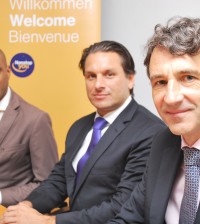Lagos can sustain up to 40 million people – Fashola
Participants in the just-concluded Future Cities conference have said the summit provides a good platform for cross fertilisation of ideas to address the myriad challenges that confront Africa’s urban cities. They commended Economist Conferences, organisers of the conference, for contributing immensely to the development of Africa’s urban transformation.
The conference was subtitled “Managing Africa’s Urban Transformation”. Babatunde Fashola, the Executive Governor of Lagos shared his experiences and challenges around the governance of Lagos State. The conference also featured Patricia de Lille, Didas Massaburi, Muchadeyi Masunda and Parks Tau Executive Mayors of Cape Town, Das Es Salaam, Harare, and Johannesburg respectively.
The governor of Lagos informed participants at the conference that the state earns most of its revenue from taxes, which he referred to as a commitment by all Lagosians to fix their infrastructure.
“Lagos can sustain up to 40 million people, we are planning towards this by building upwards rather than sideways”. He credited his success to collaboration between the government and the private sector through Public Private Partnerships (PPPs) in the provision of roads, education, environment, water supply, transportation and other infrastructure that have improved the living condition of the 20 million state residents.
Commenting on urban housing and the development of sustainable, long-term approaches to housing, Alioune Badiane, Director, Project Office, UN-Habitat, opined that many government sectors do not understand the power of housing. He revealed that 70 per cent of Africans live in poor settlements, a situation he attributed to factors such as “bad governance, lack of political will and inconsistency in socio-economic policies which affect urban housing.”
The summit also provided a platform for participants to debate challenging questions around managing, designing and financing the continent’s cities. Other experts who spoke at the conference included David Adjaye OBE, an award-winning, internationally renowned architect; Dayo Mobereola, Managing Director, Lagos Metropolitan Area Transport Authority; Arnold Meyer, Head of Real Estate (Africa) of the Renaissance Group; and Marie Francoise Marie-Nelly, Country Director, Nigeria of the World Bank.
Other speakers included Ory Okolloh, Policy Manager and Government Relations manager, Google Africa; Paul Hinks, CEO, Symbion Power Holdings; Kola Karim, Group Managing Director, Shoreline Energy International and David Frame, MD, Eko Atlantic and many others.
Dougal Thomson, chairman of the Future Cities summit, expressed satisfaction with the outcome of the conference and commended the participants for their robust participation in the sessions. He stated that the conference was brought to Lagos with the intention of focusing minds on the scale of the challenges facing African cities and how they can cope with the projected influx of hundreds of millions of extra citizens over the next decade.
According to him, “The scale and the speed of this migration to the city is incredible; we want the conference to focus governments’ minds, engaging them in constructive discussion and dialogue about how cities can prepare to welcome these extra citizens, asking what kind of changes they need to their infrastructure, to their governance, to become fully functional places that are efficient, great places for people to live, places that provide for people’s needs – housing, transport, jobs, water.”
“For me, the most exciting thing to come out of the conference was the discussions around how new technology and a networked society can meet a lot of these challenges. It is clear that as the internet takes off it will be much easier for cities to function efficiently and effectively; easier for people to move around these cities; and easier for citizens to engage with government and vice versa,” he continued.








